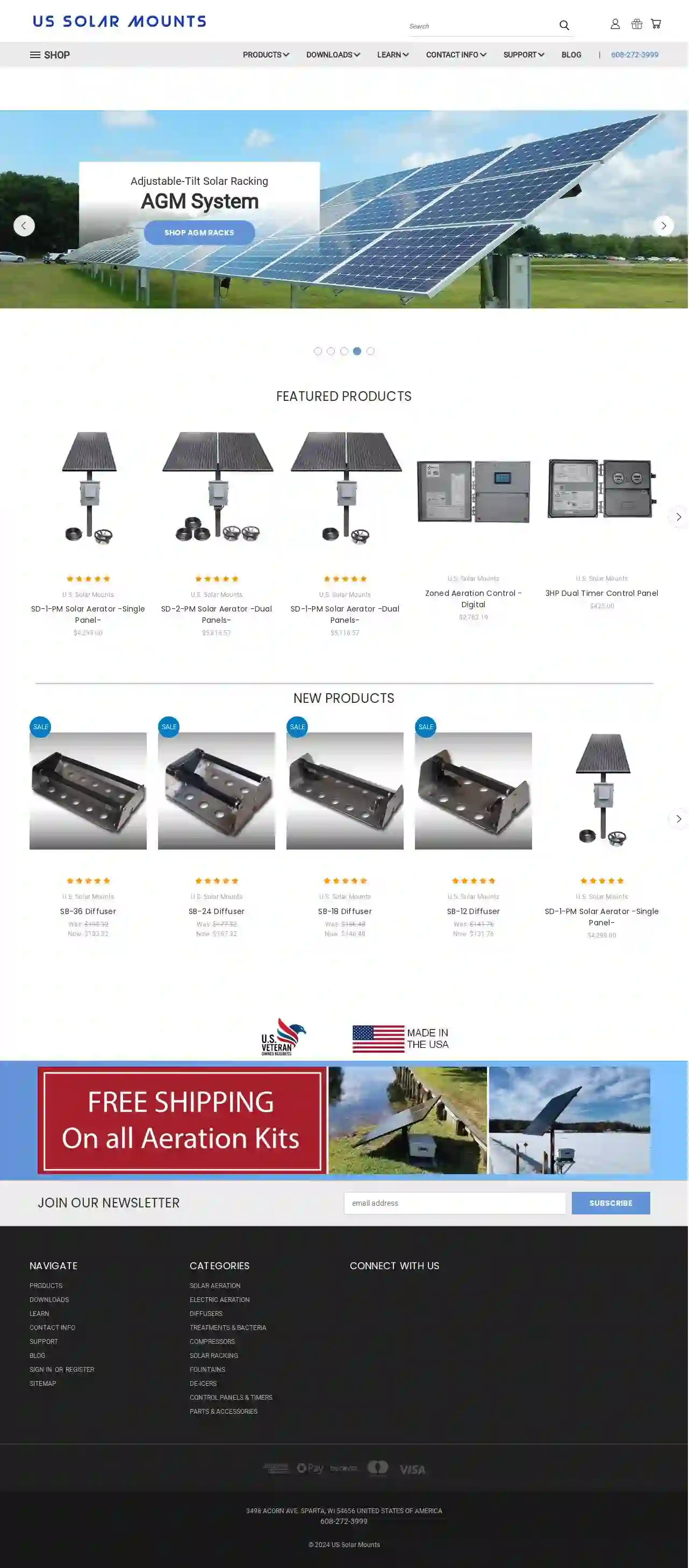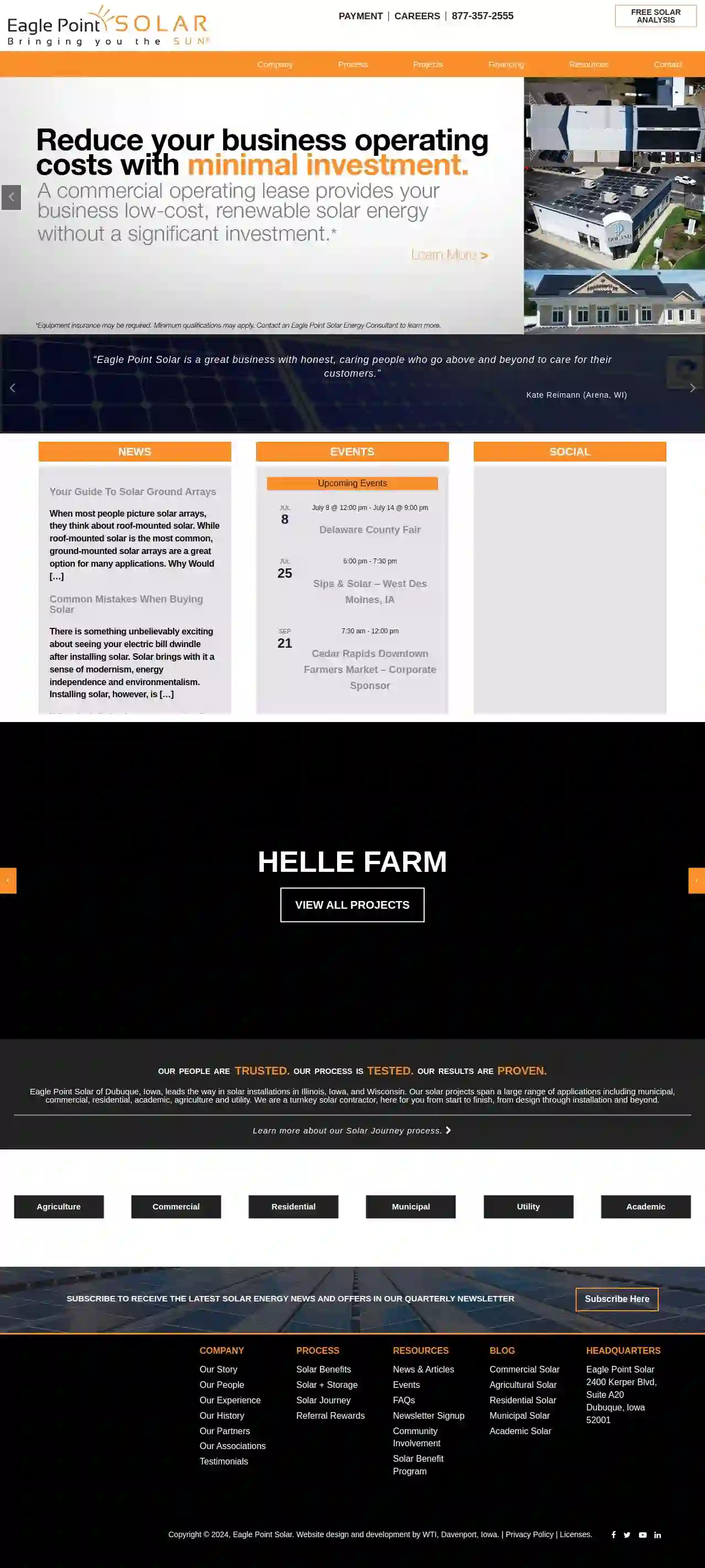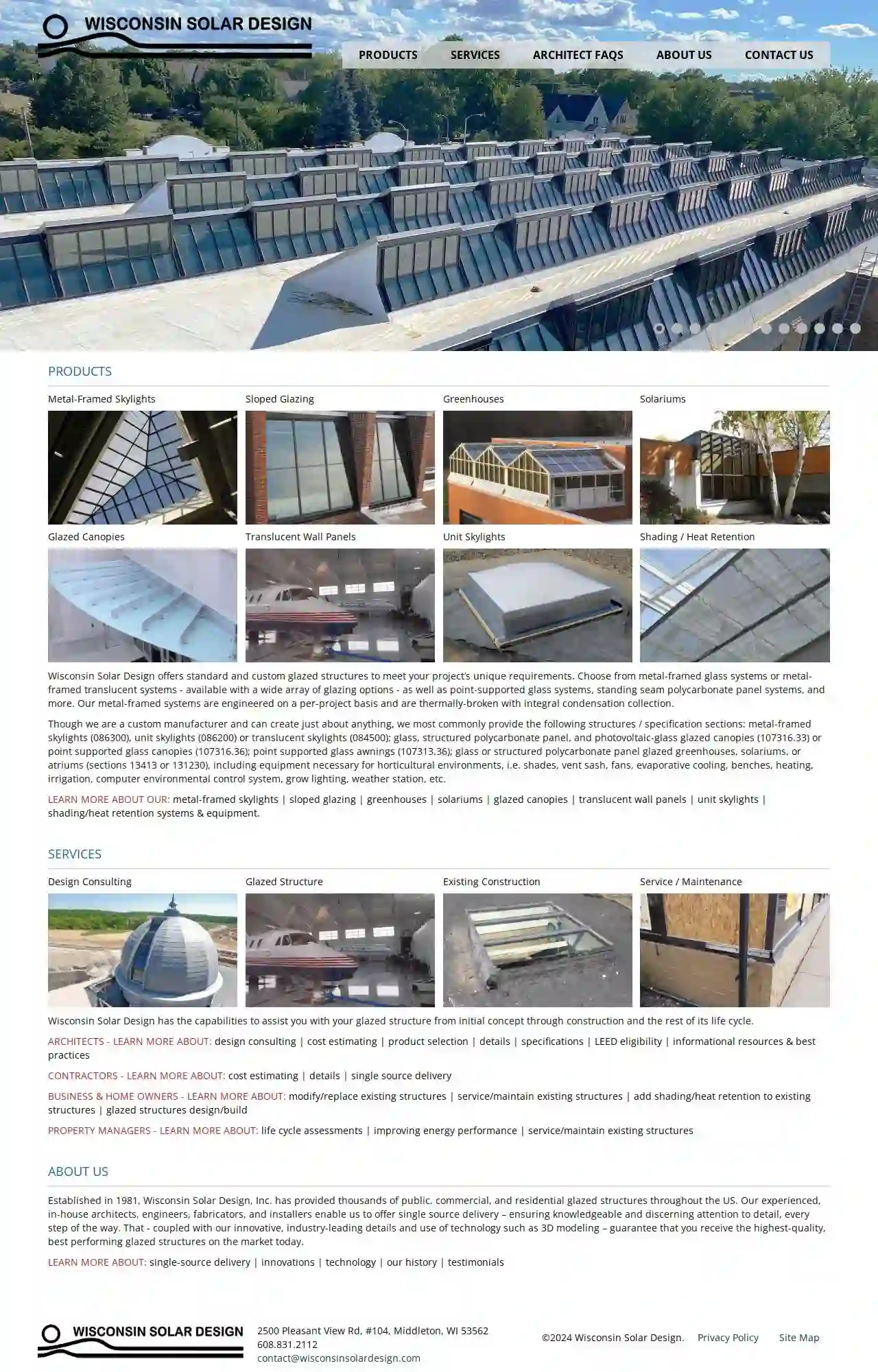Solar Installers Madison
Top Solar Panel Installers in Madison
Get multiple Solar Installer quotes for your project today! Compare profiles, reviews, accreditations, portfolio, etc... and choose the best service.

U.S. Solar Mounts Corp
3.73 reviews3498 Acorn Ave., Sparta, WI, 54656, USU.S. Solar Mounts is a leading provider of solar aeration systems, electric aeration, diffusers, treatments, compressors, solar racking, fountains, de-icers, control panels, and timers. They offer a wide range of products designed for various applications, including pond aeration, water treatment, and solar power solutions. Their products are designed to be reliable, efficient, and easy to install, making them suitable for both residential and commercial use. The company also provides resources such as manuals, spec sheets, and FAQs to help customers understand and maintain their products.
- Services
- Why Us?
- Accreditations
- Our Team
- Testimonials
- Gallery
Get Quote
Endries Solar And Electric
4.923 reviewsUnit 5, Oostburg, WI, 200 S Business Park Drive, 53070, USEndries Solar & Electric is a leading provider of solar products and services. We call the Sheboygan area our home, with our installation territory covering north of Green Bay, the Fox Valley, around Madison and as far south as the Wisconsin/Illinois border.
- Services
- Why Us?
- Accreditations
- Our Team
- Testimonials
- Gallery
Get Quote
Eagle Point Solar
4.5158 reviews2400 Kerper Blvd, Suite A20, Dubuque, 52001, USEagle Point Solar is a leading provider of solar energy solutions, dedicated to helping individuals and businesses harness the power of the sun. With a strong commitment to sustainability and customer satisfaction, Eagle Point Solar offers a range of services including solar panel installation, solar storage solutions, and solar maintenance. Their team of experienced professionals ensures that every project meets the highest standards of quality and efficiency.
- Services
- Why Us?
- Accreditations
- Our Team
- Testimonials
- Gallery
Get Quote
Renew Wisconsin Inc
4.25 reviewsSuite 300, Madison, WI, 214 North Hamilton Street, 53703, USRENEW Wisconsin is a nonprofit organization dedicated to building a stronger, healthier, more vibrant Wisconsin through the advancement of renewable energy. We work on policies and programs that expand solar power, wind power, renewable fuels, local hydropower, building electrification, energy storage, and electric vehicles.
- Services
- Why Us?
- Accreditations
- Our Team
- Testimonials
- Gallery
Get Quote
Everlight Solar
4.5852 reviewsMenomonee Falls, WI, W134N5450, Campbell Dr Suite 2, 53051, USEverlight Solar is a leading provider of solar energy solutions, dedicated to helping homeowners and businesses harness the power of the sun to save money and reduce their carbon footprint. With a team of experienced professionals and a commitment to quality, Everlight Solar offers a range of services including solar panel installation, maintenance, and repair. They are certified by NABCEP and have received numerous awards for their work, including being named one of the fastest growing companies in the US by Inc. 5000.
- Services
- Why Us?
- Accreditations
- Our Team
- Testimonials
- Gallery
Get Quote
Au Solar Services LLC
512 reviewsWest Allis, WI, 53214, USAu Solar Services is a certified Enphase Technician providing a range of services including Enphase system servicing, underproduction assessment, critter guard installation, panel removal and reinstall, off-grid solar and storage install, and solar snow guard. With 3 years of experience in the solar industry, a Residential Journeyman Electrician license, Better Business Bureau Accreditation, NABCEP Photovoltaic Associates Degree, Enphase Energy System Certifications, and MREA membership, clients can trust in the highest quality care for their solar systems.
- Services
- Why Us?
- Accreditations
- Our Team
- Gallery
Get Quote
Midwest Solar Power
4.971 reviewsMadison, WI, USA, 816 Walsh Rd, 53714, USMidwest Solar Power LLC was founded in 2009, bringing together backgrounds in construction, project management, and customer service to modernize the solar installation business. The company strives to be the premier local solar installer in Dane County by doing honest, high-quality work at a fair price. Each installation is unique, and Midwest Solar Power can design the right system to meet your energy needs.
- Services
- Why Us?
- Accreditations
- Our Team
- Testimonials
- Gallery
Get Quote
Solar Forma Design
1106 Mondovi Rd Suite 209, Eau Claire, 54701, USSolar Forma Design is a company that specializes in solar-powered products, including the E-CACIA Solar Tree, WAVE Solar Carport, POD Solar Seating, and MYKĒS Conduit Seating. They aim to redefine solar energy for good and have been a grant recipient of the UW System Ideadvance Seed Fund.
- Services
- Why Us?
- Accreditations
- Gallery
Get Quote
Wisconsin Solar Design Inc.
2500 Pleasant View Road, Middleton, WI 53562, Madison, 53562, USEstablished in 1981, Wisconsin Solar Design, Inc. has provided thousands of public, commercial, and residential clients with custom glazed structures. Their team of architects and engineers utilize the latest in CAD and 3D modeling to prepare drawings and virtually mock-up details. This enables them to quickly and precisely fabricate projects in their modern shop facility. Wisconsin Solar Design offers standard and custom glazed structures to meet unique project requirements, including metal-framed glass systems, metal-framed translucent systems, point-supported glass systems, standing seam polycarbonate panel systems, and more.
- Services
- Why Us?
- Accreditations
- Our Team
- Testimonials
- Gallery
Get Quote
Midwest Solars
53 reviewsMondovi, Wisconsin, United States, 910, Countryside Parkway, 54755, USMidwest Solars, a division of Tecom LLC, started in 2019 as a dream between friends. Tom Wingert, owner of Tecom LLC and Andy Van Roo, decided to form a solar company from the ground up in rural Western Wisconsin. The first project was a commercial building owned by Van Roo. Together, they hope to expand renewable energy in the domestic United States. Tom has a wealth of experience and knowledge with solar in Florida and has worked for Tesla Energy and Amazon. Midwest Solars is actively developing multi Megawatt Projects in Wisconsin, Texas, Ohio, Pennsylvania, Virginia, and Vermont. They serve all 50 states.
- Services
- Why Us?
- Accreditations
- Our Team
- Testimonials
- Gallery
Get Quote
Over 4,210+ Solar Installers on our directory
Our solar experts operate in Madison & surrounding areas!
SolarCompaniesHub has curated and vetted the Best Solar Installers in Madison. Find a top & trustworthy business today.
Frequently Asked Questions About Solar Installers
- System size
- Roof complexity
- Weather conditions
- Permitting and inspections
- Installer's schedule
- Monocrystalline: Made from a single silicon crystal, known for high efficiency (typically 18-22%) and sleek black appearance.
- Polycrystalline: Made from multiple silicon crystals, slightly less efficient (15-17%) but often more affordable than monocrystalline.
- Thin-film: Made from thin layers of photovoltaic material, lower efficiency (8-12%) but can be flexible and lightweight.
Do I need planning permission to install solar panels in USA?
How long does it take to install solar panels?
What is net metering, and how does it work?
What are the different types of solar panels?
Do I need planning permission to install solar panels in USA?
How long does it take to install solar panels?
- System size
- Roof complexity
- Weather conditions
- Permitting and inspections
- Installer's schedule
What is net metering, and how does it work?
What are the different types of solar panels?
- Monocrystalline: Made from a single silicon crystal, known for high efficiency (typically 18-22%) and sleek black appearance.
- Polycrystalline: Made from multiple silicon crystals, slightly less efficient (15-17%) but often more affordable than monocrystalline.
- Thin-film: Made from thin layers of photovoltaic material, lower efficiency (8-12%) but can be flexible and lightweight.